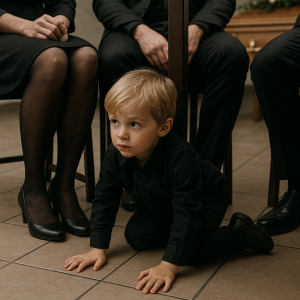He jeered at the maid and ordered her to play the piano in front of his wealthy guests — but when her fingers touched the keys, the entire hall fell silent.
That morning seemed like any other at the country estate of Mikhail Sergeyevich Artamonov, until a new maid appeared. Her name was Lena — barely in her twenties, frail, with eyes that looked as if they had witnessed more years than her age allowed. She carried no suitcase, only a crumpled paper bag, and when she was introduced by the housekeeper as a temporary worker from an agency, Mikhail hardly noticed her name. It didn’t matter. People in his world had fixed roles: some drove limousines, others scrubbed floors.
But Lena stood apart. She didn’t force smiles or try to win favor. She moved lightly, gracefully, as though guided by an unheard rhythm. Once, Mikhail caught her lingering gaze on the grand Steinway piano in the drawing room. That evening he found her there, her hand brushing the lid, her expression filled with a deep, reverent longing, as though the instrument were a lost home she could not enter.
“Don’t even think about touching it,” Mikhail said from the shadows.

She jumped back.
“It’s a Steinway,” he added icily. “Worth more than everything in your village put together.”
“I’m sorry,” she whispered, and slipped away.
Yet from that night he began to notice her. Her quiet composure unsettled him. She seemed to exist in a space where his wealth and authority meant nothing. And that irked him.
At a glittering dinner, while conversations drifted between yachts and million-dollar deals, Mikhail suddenly called out, “Lena, come here.” Guests turned, startled; the master of the house never addressed servants in front of others. She froze, tray in hand. He smirked and said, “You’re always staring at the piano. Do you think you can play?” She met his eyes, calm, almost unflinching.
“Then play,” he mocked. “Or are you too scared?”
The room buzzed with snickers. Everyone braced for a spectacle.
Lena set her tray down, walked slowly to the piano, and sat. She lifted the lid, placed her hands on the keys. The first sounds were fragile, hesitant. But then Chopin’s music unfolded, no longer notes on a page but a raw confession — aching, luminous, alive.
Laughter died. Glasses hung midair. People leaned forward, transfixed. In that moment there were no ranks, no wealth, no hierarchy — only music, laying bare a truth no money could purchase.
When the final chord dissolved into silence, not a soul moved. For a heartbeat the room stood still. Then applause erupted — first a hesitant clap, then another, until the hall roared. “Bravo!” cried one of the guests. “What an extraordinary girl, Mikhail Sergeyevich — where did you find her?” The laughter that followed was no longer mocking, but admiring. Lena bowed slightly and slipped away.
Mikhail sat rigid, his untouched wine warm in his hand. For the first time in years, he wasn’t the center of his own drawing room.
The next day he asked the housekeeper, trying to sound casual, “That maid — who is she?” He was told Lena was an orphan, once a music student, talented but forced by hardship to abandon her studies. She had agreed to work for pennies because she had nowhere else to go. That evening he confronted her again. “How do you play like that?” he asked. “I studied once,” she answered softly. “But sometimes dreams cost more than bread. And bread is what you must choose.”
From then on, though she never touched the piano before him, the echo of her music seemed to linger in the house. Mikhail found himself haunted by it, even when other musicians came to perform. Their skill was flawless, but soulless. He realized, perhaps for the first time, what he had been missing all his life.
One night he caught her scribbling in a notebook. Inside were compositions of her own. “You write music?” he asked, astonished. She blushed. “Sometimes. But who would want it? At the conservatory they accept only the well-connected. Me… I’m only good for scrubbing floors.”
He disagreed. At another gathering, he gently urged her to play again. This time she performed her own piece — simple, luminous, brimming with sincerity. The guests were awestruck. When they asked who the composer was, she merely replied, “No one.” But Mikhail knew.
Word spread of the “maid who played.” Some in the household grew envious, whispering that she thought too highly of herself. Soon she wept, telling him they wanted her dismissed. For the first time in his life, Mikhail defended someone else. “No one is sending you away,” he said firmly.
Guests now came hoping to hear her. Even his business partner joked cruelly, “Your maid outshines the whole philharmonic — perhaps open her a stage?” But Lena, lowering her eyes, answered, “Music is for the soul, not for sale.” And in that moment, Mikhail understood he could not keep her talent hidden.
He invited a conservatory professor to listen. Reluctantly, Lena played. When she finished, the professor rose. “This gift is rare. She must study. She belongs on the stage.”
Lena hesitated — fearful of losing her meager income. Mikhail assured her she could stay in his house and study. When she asked why he was helping, he had no answer but the truth he barely admitted to himself: without her music, his world was barren.
Time passed. Lena’s name began to circulate among musicians. Invitations arrived. At her first small concert, she trembled as she took the stage in a plain dress. But once she began to play, the audience was spellbound. The ovation was thunderous. Backstage, she cried from relief. “I was sure they’d laugh,” she confessed. “No one could laugh at you,” Mikhail told her. “You play in a way that makes people forget to breathe.”
As the months rolled on, she grew in stature. Patrons, conductors, and critics praised her. Yet through it all she remained the same girl who once pressed her hand against the closed lid of a Steinway. To Mikhail she became not merely a maid or even a prodigy, but the one person whose presence stripped him of his armor.
Eventually he admitted aloud: “I always thought power was everything. But when you play, I realize all of that is empty. True strength is in what you do.”
Five years later, posters in major cities bore the name Elena Ivanova. Her concerts sold out. Audiences stood weeping, applauding. And somewhere in the crowd, unnoticed, Mikhail sat quietly, proud. No one remembered that once she had scrubbed floors. They called her “the girl who brings hearts to life.”
And he knew: on that night, when he had mocked her with the words, “Play, maid!” he had unwittingly set in motion the most meaningful act of his entire life.









